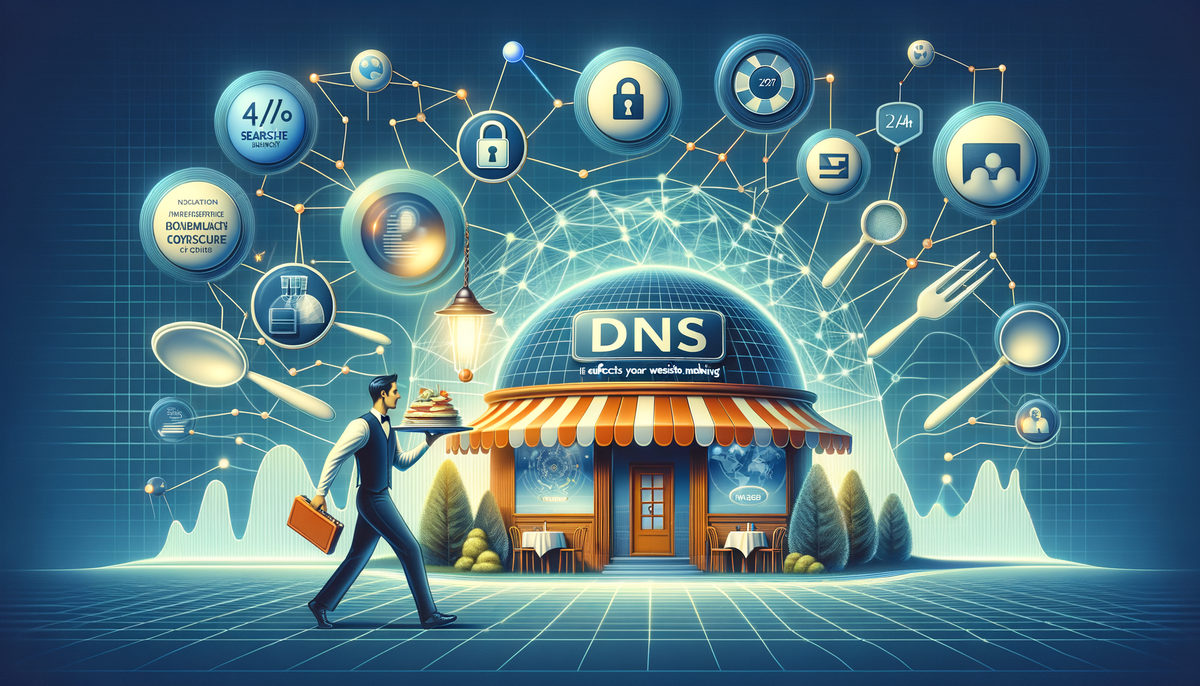The Impact of DNS on SEO: How It Affects Your Website Ranking
DNS affects your website's SEO by influencing its speed, reliability, and security. Fast, reliable DNS boosts your rankings, attracting more visitors. Learn how to optimize your DNS settings and use Google Search Console to monitor your website's performance.

Imagine you're trying to find a friend's house. You know their address, but you need a map to find the right street and number. DNS, or the Domain Name System, works like a map for the internet. It helps computers find websites by converting easy-to-remember website names, like example.com, into addresses computers understand. But just like a map can be outdated or confusing, DNS can also affect how well your website performs in search results.
How DNS Affects SEO
Think of SEO as a game of getting your website noticed by search engines like Google. They use robots called crawlers to visit websites, read their content, and decide how relevant they are to search terms people use. A fast and reliable DNS can help your website get a better score in this game.
1. DNS Speed: How Fast Your Website Loads
- What it is: DNS speed measures how quickly your website's address is translated into a computer-readable address. Think of it like how fast a restaurant waiter brings you the menu.
- Why it matters: If your DNS is slow, it takes longer for visitors to see your website. Google wants to show people websites that load quickly, so a slow DNS can hurt your rankings.
- Example: Imagine you're searching for a recipe online. You click on a website, but it takes forever to load. You might get frustrated and leave to find a faster website. This is called a "bounce," and Google doesn't like websites with lots of bounces.
How to check and improve your DNS speed:
-
Use tools: Try Google's Public DNS or Cloudflare's 1.1.1.1 to see how fast your DNS is.
-
Change your DNS settings: In your computer's network settings, you can change the DNS server you use. This is like choosing a different restaurant waiter.
- Example (Windows): Open your network settings, find the "Internet Protocol Version 4 (TCP/IPv4)" settings, and change the "Preferred DNS server" to
8.8.8.8and the "Alternate DNS server" to8.8.4.4(Google's Public DNS). - Example (Linux): Open a terminal and type
sudo nano /etc/resolv.conf. Then, add the following lines:
nameserver 8.8.8.8 nameserver 8.8.4.4 - Example (Windows): Open your network settings, find the "Internet Protocol Version 4 (TCP/IPv4)" settings, and change the "Preferred DNS server" to
2. DNS Reliability: Keeping Your Website Online
- What it is: DNS reliability means your website's address is always available. It's like making sure your restaurant's phone number always works.
- Why it matters: If your DNS is unreliable, people can't visit your website. Google doesn't like websites that are unavailable, and it can hurt your rankings.
- Example: Imagine you're trying to order pizza online, but the website keeps crashing. You'll probably try a different pizza place.
How to make sure your DNS is reliable:
- Choose a reliable DNS provider: Use trusted providers like Google DNS, Cloudflare, or OpenDNS.
- Check their service level agreements (SLAs): SLAs are promises that your provider will keep your website's address working a certain percentage of the time. Look for providers with high uptime (like 99.99%).
- Monitor your DNS: Use a service like UptimeRobot to check if your website's address is working correctly.
3. DNS Security: Protecting Your Website from Hackers
- What it is: DNS security is about keeping your website's address safe from hackers. It's like having a strong lock on your restaurant door.
- Why it matters: If hackers attack your DNS, they could redirect people to a fake website that looks like yours. This can harm your reputation and make people distrust your business.
- Example: Imagine you're searching for a movie ticket website, but you accidentally click on a fake website that looks like the real one. You might end up giving your credit card information to a scammer.
How to keep your DNS secure:
- Use DNSSEC (DNS Security Extensions): This is like adding a special code to your website's address to verify that it's real.
- Monitor for threats: Use tools like Google's Safe Browsing (found in the Search Console) to check if your website has been compromised.
- Use tools to analyze your DNSSEC settings: Tools like DNSViz can help make sure your security measures are working correctly.
How DNS and Google Search Console Work Together
Google Search Console is a free tool that helps you understand how Google sees your website. It can tell you about any problems, like slow loading times or DNS issues. Here's how to use it:
- Verify your domain: This is like telling Google that you're the owner of your website. There are different ways to verify, but one common way is to add a special code (called a TXT record) to your DNS settings.
- Check for DNS errors: Regularly check the "Coverage" report in Search Console to see if there are any issues with your website's address.
- Set up alerts: You can get emails when Google finds a problem, so you can fix it quickly.
Conclusion
DNS might seem like a technical detail, but it has a big impact on your website's success. By focusing on DNS speed, reliability, and security, you can improve your website's performance and make it more visible to search engines. This can help you get more visitors and grow your business online.
Remember:
- Use a fast and reliable DNS provider.
- Check your DNS speed, uptime, and security regularly.
- Use tools like Google Search Console to monitor your website and get alerts about potential problems.
By taking care of your DNS, you can give your website a winning edge in the search engine game.




